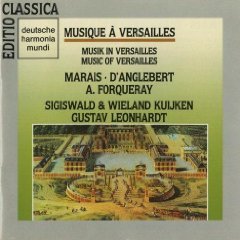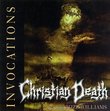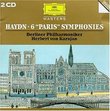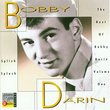| All Artists: Leonhardt, Kuijken Title: Musique A Versailles Members Wishing: 0 Total Copies: 0 Label: RCA Release Date: 12/3/1992 Genre: Classical Styles: Chamber Music, Historical Periods, Baroque (c.1600-1750) Number of Discs: 1 SwapaCD Credits: 1 UPC: 054727714528 |
Search - Leonhardt, Kuijken :: Musique A Versailles
CD DetailsSimilar CDs
|
CD ReviewsExtravagant music FrKurt Messick | Bloomington, IN USA | 09/29/2005 (5 out of 5 stars) "This music, the Music of Versailles (Musique a Versailles), consists of pieces from the composers Marin Marais, Jean Henri d'Anglebert, and Antoine Forqueray, composers of the late seventeenth/early eighteenth century. This is chamber music that was composed and performed at the Palace of Versailles for the French Royal Family and aristocracy. There is great expressiveness and ornamentation in the music, as one would expect in the highly decorated surroundings and courtly life of France of the period.
Jean Henri d'Anglebert held the position as harpsicordist to King Louis XIV (before this he served as organist for the Duke of Orléans and the Jacobins in the rue St. Honoré), and was a court composer as well, making a major contribution to the evolution of French musical ornamentation with regard keyboard instruments. He succeeded Chambonnières as harpsichordist to Louis XIV, a position later held by his son. One of the notable accomplishments of d'Anglebert was to transcribe opera and other tunes for keyboard for the court. Marin Marais was a leading figure in France among bass violin composers and performers at this same time. His whole life was spent in Paris, most of it in royal service. First he appointed as Musicien Ordinaire de la Chambre du Roi in 1685, keeping that post throughout the reign of Louis XIV and for ten years served under the Regency and the reign of Louis XV. He was recognised by his fellow musicians as an outstanding performer and composer of note whose compositions became well known throughout France and beyond. Antoine Forqueray was 16 years younger than Marais, and considered a child prodigy. He grew up to have the reputation of being crabby, crotchety and odd in character, but his reputation as performer of the bass viol. He was appointed Musicien Ordinaire de la Chambre du Roi in 1689, with his wife often accompanying him on the harpsichord. By 1730 Antoine Forqueray had retired to Nantes, and was succeeded by his son Jean-Baptiste at court in 1742. The music performed here represents some of the best of the compositions of the period. It is highly stylised and extravagant, calling for performers sensitive and skillful for the type of music. Gustav Leonhardt, a Dutch harpischordist, as spent a career recovering faithfulness to this period of music. The brothers of Sigiswald and Wieland Kuijken on strings (violin and viola da gamba) complements his performance style nicely. This recording was done in 1970, transfered masterfully by Deutsche Harmonia Mundi in 1990 to CD. This is a marvelous recording. " |






